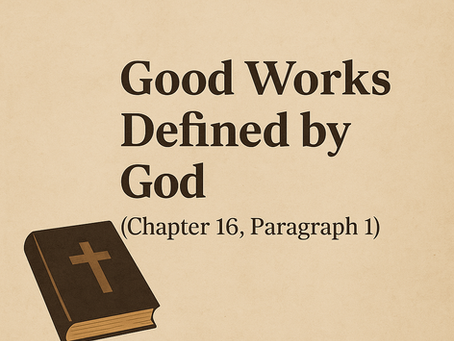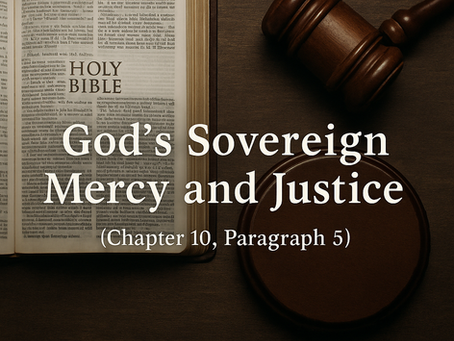top of page
Lighthouse Fellowship Reformed Church
Search

1689 Confession of Faith
Introduction to the 1689.


The Purpose and Fruit of Good Works (Chapter 16, Paragraph 2)
Good works are not the root of our salvation, but they are its fruit. This paragraph teaches that good works, while not meritorious, serve vital purposes in the Christian life. They are expressions of gratitude to God, evidences of true faith, tools for strengthening assurance, means of building up fellow believers, and lights to the watching world. Good works glorify God by displaying His grace at work in us.
Oct 4, 20253 min read


Good Works Defined by God (Chapter 16, Paragraph 1)
This paragraph defines good works according to Scripture. True good works are not determined by human tradition or imagination, but by God’s revealed will. They are actions done in obedience to His Word and spring from saving faith. Though good works do not save, they are the necessary fruit of genuine faith and the Spirit’s work. They glorify God, benefit others, and affirm the believer’s transformation.
Oct 4, 20251 min read


No Sin Beyond Repentance (Chapter 15, Paragraph 4)
Paragraph 4 offers great comfort: no sin is too great to be forgiven when there is true repentance. While believers may fall into grievous sins—such as David’s adultery or Peter’s denial—God’s grace remains greater than their transgression. Through the covenant of grace, God has provided full and free pardon for those who repent, no matter how deeply they’ve fallen. This is not a license to sin but a promise of hope to the brokenhearted.
Oct 3, 20251 min read


The Fruits and Practice of Repentance (Chapter 15, Paragraph 3)
This paragraph teaches that saving repentance is not merely internal sorrow—it produces outward fruit. Repentance results in real change: confession of sin to God, humble prayer for forgiveness, abandonment of sinful ways, and a pursuit of obedience. True repentance is ongoing, not occasional. It touches every area of life and is to be cultivated constantly. Even after salvation, the believer must walk in daily repentance, striving to obey God by the Spirit’s power.
Oct 2, 20252 min read


The Nature of True Repentance (Chapter 15, Paragraph 2)
This paragraph explains the heart of true repentance. It is not mere remorse or fear of judgment, but a Spirit-wrought sorrow over sin as rebellion against God. The penitent sees sin for what it is—grievous and vile—and turns from it toward God with a sincere desire to obey. Repentance involves confession, prayer for pardon, and a commitment to walk in new obedience. It is not a work that earns forgiveness, but a fruit of saving grace.
Oct 1, 20252 min read


The Grace of Repentance (Chapter 15, Paragraph 1)
Repentance is not merely sorrow for sin—it is a saving grace. Paragraph 1 teaches that true repentance is granted by God and always accompanies saving faith. It flows from the Spirit’s work of conviction and leads to a heartfelt turning from sin and toward God. This turning is rooted in a sense of God’s mercy in Christ. The penitent hates sin, confesses it, and seeks pardon, not as a condition for forgiveness, but as a response to grace already given.
Sep 30, 20251 min read


Faith That Grows in Grace (Chapter 14, Paragraph 3)
Paragraph 3 acknowledges that saving faith differs in strength among believers. Though faith may be weak or strong, it is still real if it clings to Christ. True faith may be under attack, clouded by temptation, or feeble through spiritual struggle—yet it is never extinguished because it is upheld by the power of God. This comforting truth reminds us that our security rests not in the intensity of our faith, but in the object of our faith: Jesus Christ.
Sep 29, 20252 min read


The Knowledge and Trust of True Faith (Chapter 14, Paragraph 2)
Paragraph 2 explains that saving faith is more than mental assent—it includes knowledge, assent, and trust. True faith believes whatever is revealed in God's Word, especially the gospel. It receives Christ as the only Savior, trusts in Him alone for righteousness, and rests in God’s promises. This paragraph highlights that saving faith is not vague belief but a Spirit-enabled confidence in Christ and His work. It combines doctrinal conviction with personal dependence.
Sep 28, 20252 min read


The Gift and Grace of Saving Faith (Chapter 14, Paragraph 1)
Paragraph 1 teaches that saving faith is a gift from God, not a work of man. It originates from the sovereign grace of the Spirit and is normally brought about by the preaching of the Word. Faith enables a person to believe everything revealed in Scripture and trust in Christ alone for salvation. It is not generic belief, but a specific, Spirit-wrought trust in divine truth. Though sometimes strengthened by sacraments and other means, faith is fundamentally the fruit of regen
Sep 27, 20252 min read


The Ongoing Battle Within (Chapter 13, Paragraph 2)
Paragraph 2 of Chapter 13 explains the reality of indwelling sin that remains even in sanctified believers. Though the reign of sin is broken, its presence persists. The Christian life is marked by an internal struggle between the flesh and the Spirit. This war does not invalidate one’s salvation but is evidence of spiritual life. Through the Spirit’s power, the regenerate man gains victory, even while often feeling the tension and sorrow of falling short.
Sep 26, 20252 min read


The Work of God in Making Saints (Chapter 13, Paragraph 1)
Sanctification is the Spirit-wrought process of making believers holy in heart and conduct. Paragraph 1 teaches that it begins at regeneration and continues throughout the Christian life. Through union with Christ and the power of the Holy Spirit, sin’s dominion is broken, and the believer is enabled more and more to walk in righteousness. This progressive transformation is not our own doing, but flows from the merits of Christ and the Word of God applied to our hearts.
Sep 25, 20252 min read


Adopted into the Family of God (Chapter 12, Paragraph 1)
“All those that are justified, God vouchsafed, in and for the sake of His only Son Jesus Christ…” The Father bestows the privilege of...
Sep 24, 20252 min read


Justified Now—Not by Works, but by Grace (Chapter 11, Paragraph 6)
Paragraph 6 closes the chapter on justification by rejecting the notion that anyone is justified based on good works—whether under the law of nature or the Mosaic law. It reinforces that no one can meet God's perfect standard of righteousness, and therefore, justification must come entirely by God’s grace through Christ’s righteousness imputed to us. This paragraph defends the heart of the gospel against legalism and self-righteousness
Sep 23, 20253 min read


Ongoing Forgiveness in the Life of the Justified (Chapter 11, Paragraph 5)
Paragraph 5 explains that while justification is a one-time legal act, God continues to forgive the daily sins of believers. Justified saints never fall out of favor in terms of their legal standing before God, but their fellowship with Him can be affected by sin. When they grieve the Holy Spirit, they may lose the light of God's countenance until they humble themselves, confess their sins, and renew faith and repentance.
Sep 22, 20252 min read


Faith as the Instrument, Not the Cause, of Justification (Chapter 11, Paragraph 4)
Paragraph 4 teaches that justification is applied personally through faith—not because of faith, as if faith earns salvation, but through faith as the means of receiving Christ. Faith is the empty hand that receives a gift, not the merit that earns it. Justification never comes before the moment a sinner believes, even though God’s plan and Christ’s work are eternal. This preserves both the freeness of grace and the necessity of faith.
Sep 21, 20252 min read


Christ’s Righteousness Imputed, Not Infused (Chapter 11, Paragraph 3)
Paragraph 3 of the Confession makes a vital distinction: justification is based on the imputation of Christ’s righteousness, not on any internal transformation. God counts Christ’s perfect obedience and sacrificial death as ours, legally crediting it to our account. This is not the same as making us inwardly righteous (which is sanctification); rather, it is a change in our status before God.
Sep 20, 20252 min read


Justification Before and After the Cross (Chapter 11, Paragraph 2)
Paragraph 2 of the Confession teaches that although Christ accomplished justification by His death and resurrection, God has always applied the benefits of that work to His people in time. Old Testament saints were justified by faith in the promised Messiah, just as we are justified by faith in the revealed Christ. There is no difference in the substance of justification—only in the timing of its historical application.
Sep 19, 20252 min read


Justified by Faith Alone in Christ Alone (Chapter 11, Paragraph 1)
Paragraph 1 defines justification as a legal act of God in which He pardons all our sins and declares us righteous—not by works, but by faith in Christ alone. This righteousness is not infused into us but imputed to us: Christ’s obedience and sacrifice are counted as ours. Justification is entirely of God’s grace and received through faith, itself a gift. The believer rests not in personal holiness or performance, but in the finished work of Christ.
Sep 18, 20252 min read


God’s Sovereign Mercy and Justice (Chapter 10, Paragraph 5)
Paragraph 5 brings the doctrine of effectual calling to its theological conclusion: God sovereignly gives saving grace to the elect while justly leaving others in their sin. He is not obligated to save all, nor is He unjust in withholding grace from some. The display of His mercy to the elect and His justice toward the rest both magnify His holiness.
Sep 17, 20252 min read


The Just Judgment of God on the Non-Elect (Chapter 10, Paragraph 4)
Paragraph 4 affirms a sobering truth: not all who hear the gospel are saved. Some are left in their sin, never drawn by the Spirit. Though they receive the outward call of the gospel, they are not effectually called and therefore remain hardened. This is not due to any injustice in God, but to His holy and sovereign purpose. The Confession upholds God's justice and rejects any notion of divine obligation.
Sep 16, 20252 min read
bottom of page